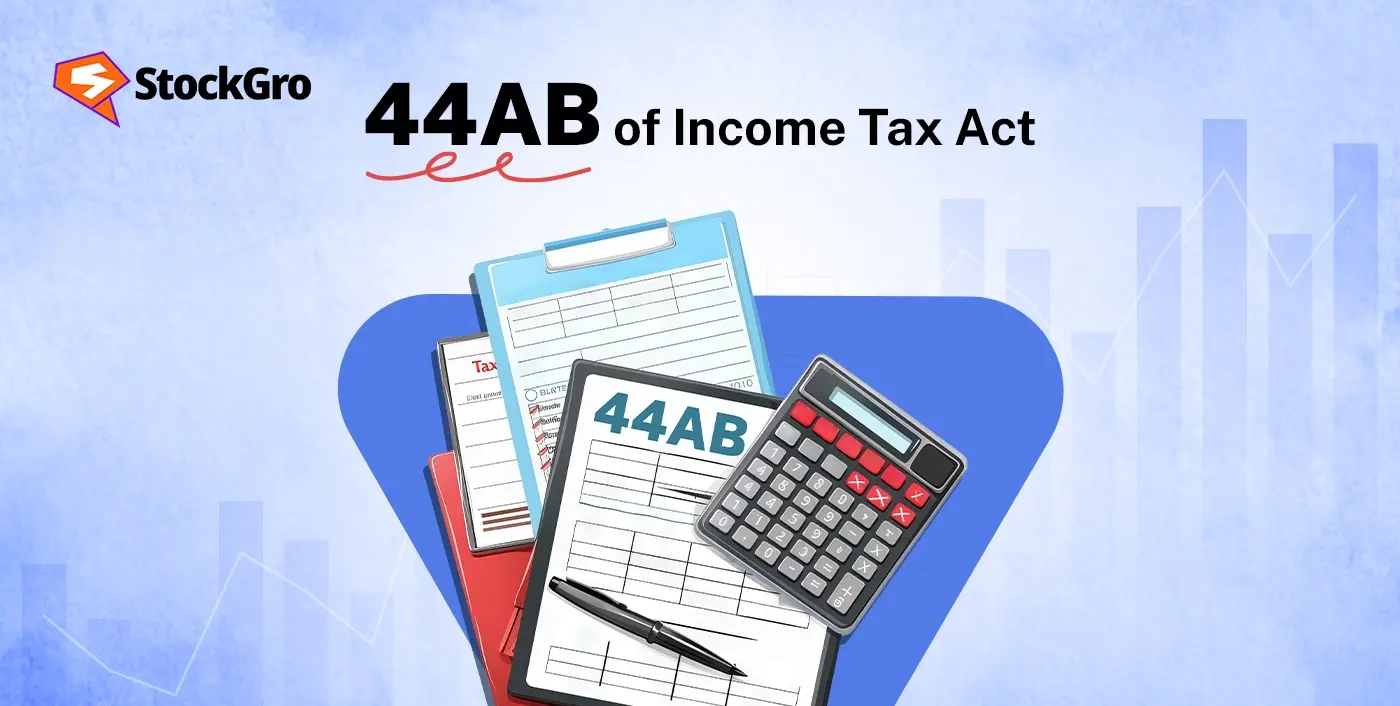
The Income Tax Act of 1961 is the principal law and regulation governing taxation in India. It defines the types of individuals, entities, and organizations required to pay taxes, and outlines the methods for calculating and determining tax liabilities. Its provisions are ubiquitous; they cover and comprehensively rule on every conceivable tax situation involving every taxpayer in India.
What is a tax audit? Think of it as a financial check-up. A chartered Accountant, our equivalent of a money doctor, performs it. To regulate and standardize this process, the Income Tax Act introduces Section 44AB, which specifies the conditions under which a tax audit becomes mandatory and who is required to undergo it.
Want to know if this applies to you? Discover more about Section 44AB and how it impacts you in our detailed blog.
What is Section 44AB?
Section 44AB of the Income Tax Act mandates truthfulness and fairness in financial dealings. It requires that if a business has a gross receipt of more than ₹1 crore in a financial year, or if a profession has a gross receipt of more than ₹50 lakhs in a financial year, the accounts of that business or profession must be audited by a Chartered Accountant. This process is called a tax audit.
When a Chartered Accountant conducts an audit, the main objective is to confirm that all income and expenses have been accurately recorded and that the government’s share of taxes has been correctly calculated.
The tax audit under Section 44AB is designed as a way to verify if the taxpayers are following the rules of the Income Tax Act. If there are errors or if someone fails to report all their income, Section 44AB helps to identify it.
Who needs a tax audit?
For businesses:
- Businesses with an annual turnover of over ₹1 crore must have their accounts statutory audited.
- If all the business transactions are done digitally and the cash component constitutes less than 5% of the payments, the minimum turnover limit goes up to ₹10 crore.
For professionals:
- Professionals such as doctors, consultants, or architects must undergo a tax audit if their annual gross receipts exceed ₹50 lakh.
Special cases:
- Some special cases include those professionals/businesses who use presumptive taxation schemes; even if one qualifies, they may require a tax audit if they declare lower income or opt-out under certain conditions.
- Rules also cover other unique conditions where it may be required.
Also Read: Section 194J: TDS on Professional or Technical Service Fees
Tax audit process
Wondering how the tax audit under section 44AB works? Let’s break it down step by step.
- Step 1: Check applicability. If a business or profession crosses the limit set under Section 44AB of the Income Tax Act, it must go through a tax audit under Section 44AB.
- Step 2: Appoint a chartered accountant (CA)
- Step 3: Preparation of documents. Gather and provide all relevant financial documents to the CA, including:
- Cash books, ledgers, journals
- Invoices (sales and purchases)
- Bank statements
- Stock records
- Balance sheet and profit & loss account
- Tracking anything where money flows.
- Step 4: Conducting audit and preparation of audit reports. The books are thoroughly reviewed and examined for accuracy, compliance, and proper disclosures. Then reports are made in prescribed forms:
- Form 3CA: If accounts are already audited under another law like the Companies Act.
- Form 3CB: If accounts are not audited under any law
- Form 3CD: Detailed statement of particulars about the business/profession and their transactions attached with Form 3CA or 3CB whichever is applicable.
- Step 5: Filing the audit report. CA files the audit report online through the Income Tax Department’s e-filing portal.
Also read: Tax Implications in Share Trading and F&O
Due dates and penalties
Make sure to complete and submit your audit report by September 30 if a tax audit is applicable. However, if your company engages in international transactions and requires a transfer pricing report, the deadline is October 31 instead.
Not complying with these deadlines can hit you in the pocket. If you don’t submit your audit report on time and the income tax authorities decide to penalise you, the penalty under Section 271B is 0.5% of your turnover or total receipts, capped at ₹1,50,000. Additionally, the tax department might disallow some of your expenses, resulting in a higher taxable income and increased tax liability.
Getting your accounts audited and reports filed on time helps avoid penalties and maintain a clean tax record.
Understand TDS on commission with Section 194H: Section 194H – TDS on Commission and Brokerage.
Bottomline
Section 44AB of the Income Tax Act, 1961, is highly significant for anyone running a business or working as a professional. It ensures fairness and transparency by verifying your accounts and confirming that your taxes are paid correctly.
Staying on top of your tax audit and filing all documents on time is crucial. It helps you avoid penalties and ensures the entire tax process runs smoothly. By following these guidelines, you reduce stress and maintain a clean record with the tax authorities!
FAQs
Section 44AD is a presumptive taxation scheme for small businesses with turnover up to ₹3 crore. Instead of tracking every expense, you declare 8% of cash turnover or 6% of digital turnover as income, making tax filing simple and reducing the compliance burden. Under this scheme, you are not required to maintain detailed books of accounts or undergo a tax audit, which saves both time and costs. This approach encourages small businesses to comply with tax laws and promotes digital transactions by offering a lower tax rate for non-cash receipts.
Section 44B deals with the taxation of income for non-residents from the business of operating ships in India. It presumes 7.5% of gross receipts from such activities as taxable income. Section 44BBA applies to non-residents operating aircraft in India, presuming 5% of gross receipts as taxable income. Both sections offer a simplified method of taxation for foreign shipping and airline operators.
Under Section 44AB of the Income Tax Act, 1961, a tax audit is mandatory for businesses with a turnover exceeding ₹1 crore. It also applies to professionals whose gross receipts exceed ₹50 lakh in a financial year. These thresholds were revised a few years ago and may be due for another upward update. However, the real focus should be accurate and compliant income tax reporting—not just on avoiding penalties for late filing.
Yes, a partnership firm may be subjected to a tax audit under Section 44AB if its business turnover surpasses ₹1 crore or professional receipts exceed ₹50 lakh in a financial year. Such an audit must be performed by a Chartered Accountant and is intended to ensure the accurate reporting of income by the partnership firm and its compliance with the various provisions of tax law.

